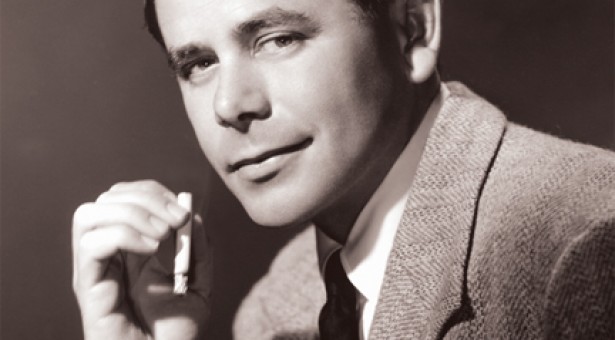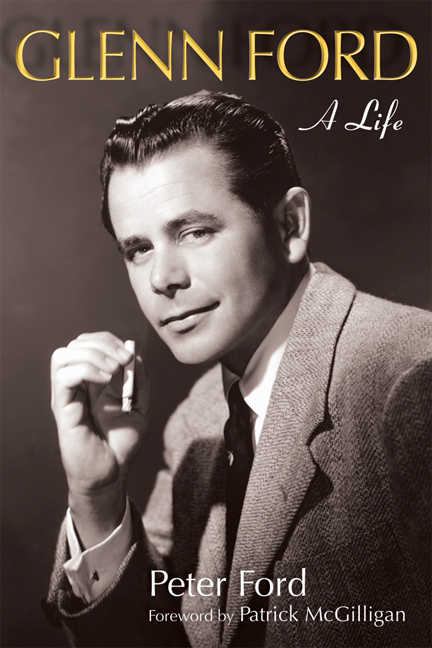Peter Ford: Glenn Ford: A Life

BOOK REVIEW: Glenn Ford: A Life (Peter Ford, 2011) – JANA BÉBAROVÁ (translated by ALŽBĚTA RYCHTECKÁ) –
Glenn Ford (born Gwyllyn Samuel Newton Ford, 1916–2006) was a renowned actor of classical Hollywood cinema. During the fifty years of his film career, he played more than a hundred characters in film and on television. Even though he seldom had the opportunity to work with great directors or auteurs of his time (exceptions include Vincente Minnelli, Frank Capra, Fritz Lang and Anthony Mann) and was not particularly lucky with the Oscars (he was awarded only one Golden Globe for his part in Capra’s Pocketful of Miracles, 1961), his legacy remains uncontested, not only within the framework of the history of classical Hollywood cinema. His name is synonymous with classical western and film noir genres, in which he played a number of unforgettable characters.
Ford’s career was not burdened by scandals, unlike the careers of other Hollywood stars. In the eyes of the public and his friends he was a modest and friendly chap who never hesitated in offering his help. However, his life did have its dark sides, as evidenced in the biography Glenn Ford: A Life, written by his only child Peter Ford (1945) and published in May 2011 by the University of Wisconsin Press at the occasion of what would have been Ford’s ninety-fifth birthday.
 When he committed the diaries that he had kept his entire life to his son, Glenn Ford already expressed the wish to have his memoirs written. It must have been a complicated task for Peter Ford though, as his father had always been a sort of enigma for him („during my whole life I never understood my father’s true feelings toward me“ p. 163 ), while his father’s marriage to Eleanor Powell (also an actress, 1912–1982) was not quite so idyllic either. It ended up in a divorce in 1959. Despite this, Peter Ford has succeeded in providing as objective an account of his father’s career and private life as possible. After all, who would be more suitable for this role than he, who both knew Glenn Ford so well and worked with him? (He co-starred with his father in eight films.) Years of meticulous research are apparent in the final version of the text. Patrick McGilligan, the editor of the Wisconsin Film Studies series, also notes in the preface that Peter Ford’s book „is bound to reshape the standard impression of Glenn Ford“ (p. ix).
When he committed the diaries that he had kept his entire life to his son, Glenn Ford already expressed the wish to have his memoirs written. It must have been a complicated task for Peter Ford though, as his father had always been a sort of enigma for him („during my whole life I never understood my father’s true feelings toward me“ p. 163 ), while his father’s marriage to Eleanor Powell (also an actress, 1912–1982) was not quite so idyllic either. It ended up in a divorce in 1959. Despite this, Peter Ford has succeeded in providing as objective an account of his father’s career and private life as possible. After all, who would be more suitable for this role than he, who both knew Glenn Ford so well and worked with him? (He co-starred with his father in eight films.) Years of meticulous research are apparent in the final version of the text. Patrick McGilligan, the editor of the Wisconsin Film Studies series, also notes in the preface that Peter Ford’s book „is bound to reshape the standard impression of Glenn Ford“ (p. ix).
Peter Ford revisits his father’s career and private life in three hundred pages divided into sixteen chapters whose intertextual titles refer to contemporary popular songs (e.g. „California Here I Come“, „Somewhere over the Rainbow“, „Love and Marriage“, „Amado Mio“, „Trouble in Paradise“ or „Rock Around the Clock“). He goes back to his father’s Canadian roots, to his childhood and youth in Los Angeles, where he moved with his parents in 1922 and where, while still at school, he began acting in theatre. In the passages about Glenn Ford’s beginnings as an actor in Santa Monica Community Players, Peter Ford mentions the formative influence of Harold Clifton, who had been his father’s advisor and had worked on films with him as well before he was succeeded in the role by Peter himself in 1968. There is Glenn Ford’s first and not-so-excellent experience with the cinema (an interview at MGM in mid-1930’s, Night in Manhattan ― a short film for Paramount (1937), Heaven with Barbed Wire Fence ― a debut in a feature road movie for Twentieth Century-Fox, which, using Dalton Trumbo’s script, was directed by the „stroheimian“ tyran Ricardo Cortez, who treated the young Ford despotically). The author then proceeds to his father’s encounter with a film agent Milton „Gummo“ Marx, to the beginnings of his long-standing work for Columbia Pictures and first films for directors such as George Marshall or Charles Vidor, with whom he cooperated repeatedly in the following years. Peter Ford also reflects on his father’s difficult readjustment after his WWII military service, which had inhibited his promising acting career. It was Bette Davis who helped in his return, having requested him as an acting partner for a self-produced Warner Bros. melodrama A Stolen Life (1946). Gilda (also 1946), where Glenn Ford became for the second time an acting partner for Rita Hayworth ― a contemporary sexual icon ― represents another crucial moment in his professional life. It surely will not pass unnoticed that the debated homoerotic liaison between Ford’s character and his protector Ballin (George Macready) is commented upon by his son in the sense that he could not recall any explicit discussion of any such implications between the male protagonists (p.64).
It is not without certain scorn that Peter Ford views his father’s cooperation with Columbia Pictures and their head Harry Cohn. Again and again, he mentions his father’s disappointment with unprestigious projects to which he was bound by the studio and the times when waiting for successful hits such as The Big Heat (1953) had to be preceded by work on mediocre projects.
The second half of the 1950’s, when Glenn Ford shot several pivotal films (e.g. Blackboard Jungle in 1955, The Teahouse of the August Moon in 1956, 3:10 to Yuma in 1957) and when he was contractually bound to MGM as well as to Columbia Pictures, is perceived by Peter Ford as the apex of his father’s career.
A great merit of Ford’s biography lies in the author’s effort to avoid what most biographers tend to do: retelling the synopses of all the actor’s films. Peter Ford easily finds a compromise between brevity and expressivity in his judgements and reflections on the contexts of film productions and also on the more personal level. Concurrently with his father’s career, he considers the evoliton of Ford’s marriage to Eleanor Powell, which was often complicated by their separation and his love affairs: „My father always needed to be „in love“ with someone ― he was lost without love. He relished having a beautiful woman on his arm.“ (p. 204).
Peter Ford does not shy away from moments of painful estrangement in his relationship to his father, which escalated mainly during his father’s third marriage, or from Glenn Ford’s arduous coming to terms with his receding fame and the loss of his loved ones at the end of the 1970’s. In particular, there were the deaths of his beloved mother Hannah, of his first wife Eleanor Powell, of his acting partners John Wayne, Henry Fonda and above all of William Holden, who had been his best friend for many years. All of this led to serious depressions and alcohol abuse, which did not help his otherwise deteriorating health.
Even though the relationship between Peter and Glenn Ford was often on the verge of estrangement, the son remembers his father with respect and love reflected in the intimate address: Dad. In order to create as exhaustive a portrait of his father as possible, Peter Ford asked for help many of his father’s friends, acquaintances and acting partners (e.g. Rhonda Flemming, Sidney Poitier, Ernest Borgnine, Russell Tamblyn, Debbie Reynolds or Shirley Jones), whose memories he exploits in the book. He also quotes passages from his father’s diaries and from love letters his father exchanged with Eleanor Powell in the periods of their separation. Peter Ford’s own reflections on his father’s films and performances are then enriched by extracts from contemporary film reviews. The final eight-page bibliography and a detailed index, as well as the complete filmography including the information about the shooting and the film premieres, evidence careful research that preceded writing of the book.
Peter Ford finishes his father’s biography saying: „A movie star never really dies, not as long as his or her work remains.“ He attends to his father’s legacy also on http://www.glennfordbio.com/ , which I can recommend as strongly as the book.
From Czech original translated by Alžběta Rychtecká.
Czech-language version of the review is available here.
Glenn Ford: A Life
Peter Ford
The University of Wisconsin Press
2011, 345 pages.






